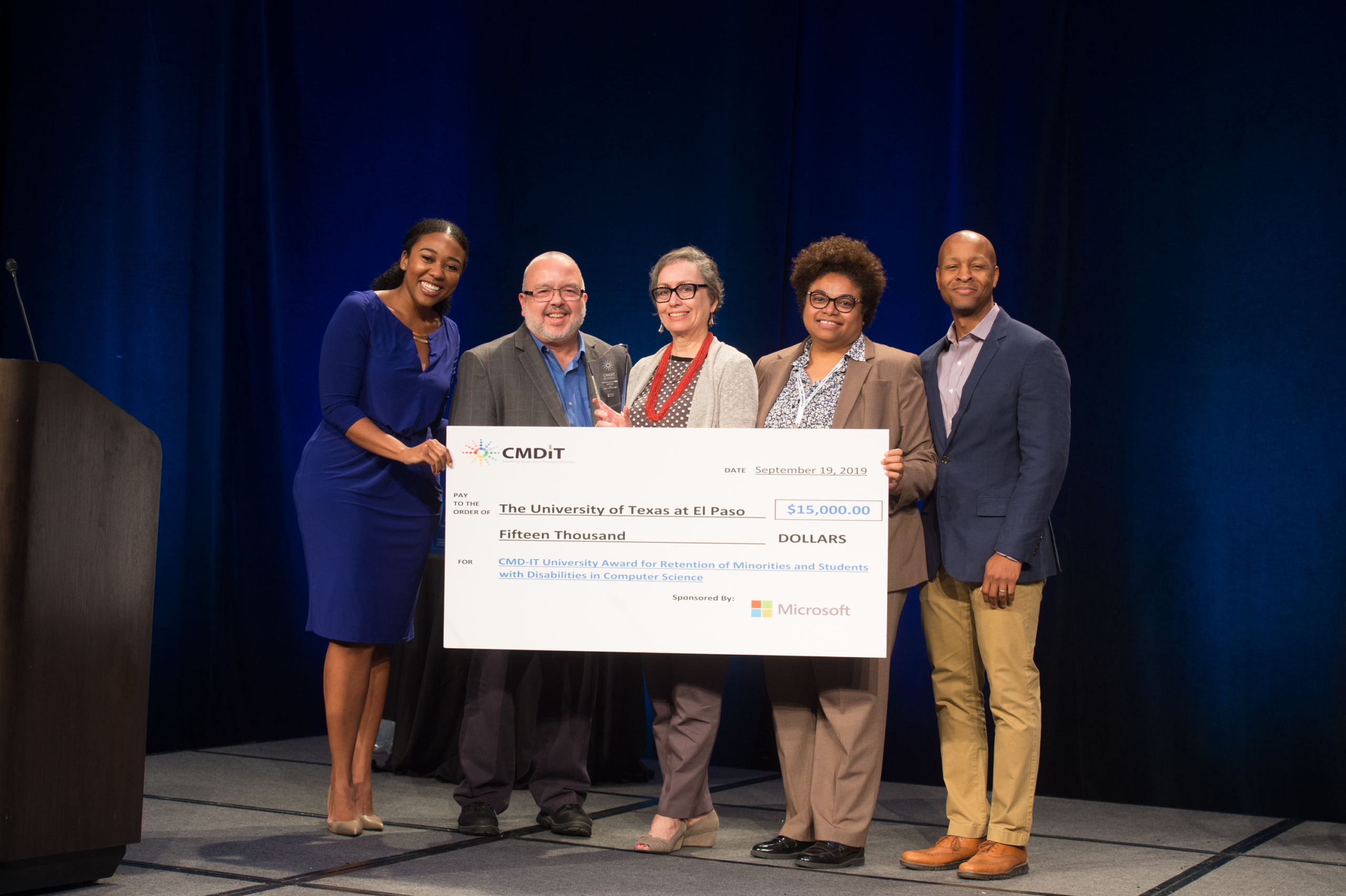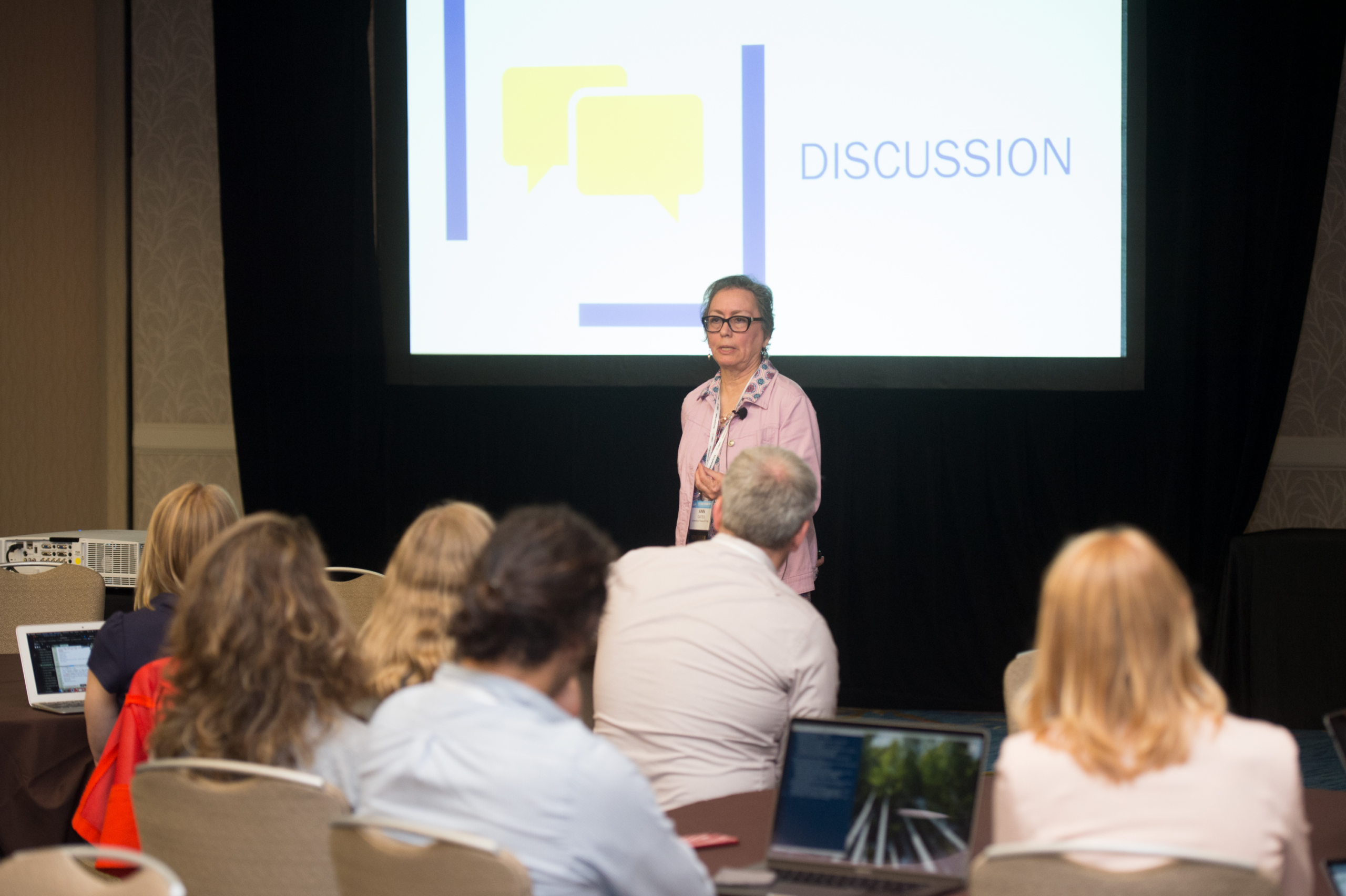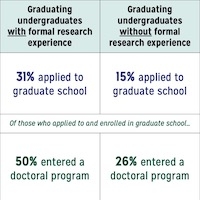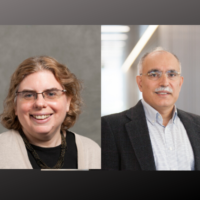Expanding the Pipeline – The 2019 CMD-IT University Award Best Practices
 The 2019 CMD-IT University Award for Retention of Minorities and Students with Disabilities in Computer Science was presented on September 19, 2019, at the 2019 ACM Richard Tapia Celebration of Diversity in Computing Conference in San Diego, CA. The third annual award was presented to the University of Texas at El Paso (UTEP).
The 2019 CMD-IT University Award for Retention of Minorities and Students with Disabilities in Computer Science was presented on September 19, 2019, at the 2019 ACM Richard Tapia Celebration of Diversity in Computing Conference in San Diego, CA. The third annual award was presented to the University of Texas at El Paso (UTEP).
The annual CMD-IT University Award recognizes US institutions that have demonstrated a commitment and shown results for increasing the computer science baccalaureate degree production of minorities and students with disabilities, through effective retention programs over the last five years. The award is focused on the following underrepresented groups: African-Americans, Native Americans, Hispanics, and people with disabilities. Introduced at the 2017 ACM Richard Tapia Celebration of Diversity in Computing Conference, the two previous award winners are Georgia Institute of Technology (2017) and the University of North Carolina at Charlotte (2018).
 UTEP has the largest Mexican-American student population among U.S. institutions designated as an R1 top tier research university by the Carnegie Classification of Institutions of Higher Education. The university has an 80% Hispanic student population and a current enrollment of more than 25,000 students with more than 21,000 undergraduates in one of the world’s largest bi-national metropolitan areas. Further, UTEP has one of the highest proportions of minority faculty among research universities in the U.S. with a 36% Hispanic-faculty composition. For the tenth consecutive year, Hispanic Business Magazine ranked UTEP’s engineering graduate programs among the top 5. Notably, in 2017, the Brookings Institution ranked UTEP #1 for its performance in both research productivity and social mobility. This is particularly significant given that more than 60% of UTEP graduates are the first in their families to earn a bachelor’s degree, 87% of the students are from the region and 51% are in the lowest income quartile.
UTEP has the largest Mexican-American student population among U.S. institutions designated as an R1 top tier research university by the Carnegie Classification of Institutions of Higher Education. The university has an 80% Hispanic student population and a current enrollment of more than 25,000 students with more than 21,000 undergraduates in one of the world’s largest bi-national metropolitan areas. Further, UTEP has one of the highest proportions of minority faculty among research universities in the U.S. with a 36% Hispanic-faculty composition. For the tenth consecutive year, Hispanic Business Magazine ranked UTEP’s engineering graduate programs among the top 5. Notably, in 2017, the Brookings Institution ranked UTEP #1 for its performance in both research productivity and social mobility. This is particularly significant given that more than 60% of UTEP graduates are the first in their families to earn a bachelor’s degree, 87% of the students are from the region and 51% are in the lowest income quartile.
The CMD-IT University Award decision was based on UTEP’s impressive quantitative reported results, which reflected high retention and graduation rates, and qualitative reporting on their various retention programs. The UTEP award submission highlighted the following programs as directly impacting retention; the programs were presented during the 2019 ACM Richard Tapia Celebration of Diversity in Computing Faculty Workshop.
- The EDGE initiative, a University-wide program led by the Provost’s Office, was UTEP’s ten year quality enhancement plan. The EDGE initiative involves faculty and staff in promoting student engagement and success through curricular, co-curricular, and extra-curricular high-impact practices. Ranging from undergraduate research and civic engagement to study abroad and student employment, these experiences are promoted to increase confidence, enhance personal and professional skills, and equip students with a competitive advantage when they graduate and enter the workforce or pursue a graduate degree.
- Computing Alliance of Hispanic-Serving Institution (CAHSI), which is led by UTEP and is one of only eight NSF INCLUDES national alliances in the country, is a consortium of over 40 institutions with a focus on the recruitment, retention, and advancement of Hispanics in computing. CAHSI was formed to address the low representation of Hispanics in computing in both higher education and the workforce through a unified effort involving administrators, faculty and professional staff, and entities from the public and private sectors. As a national INCLUDES alliance, CAHSI has adopted a collective impact framework to accelerate collaborative change through five key conditions: Common Agenda; Backbone Support; Continuous Communication; Mutually Reinforcing Activities; and Shared Measurement. CAHSI’s bold, shared vision is: By 2030, Hispanics will represent 20% or more of those who earn credentials in computing. Credentials are defined as degrees and certifications that lead to gainful employment and advancement in the field.
- Implementation of the Affinity Research Group Model (ARG). The ARG model, which was developed at UTEP in the late 1990’s, is a set of practices built on a cooperative team framework imbued with cooperative-learning principles, which have been shown to increase student achievement and self-esteem. ARG supports the creation and maintenance of dynamic and inclusive research groups in which students learn and apply the knowledge and skills required for research and cooperative work, emphasizing the conscious and explicit development of technical, professional and team skills. In addition to its application to research groups, ARG practices have been incorporated into classrooms in which structured team-based activities are needed.
- Peer-Led Team Learning (PLTL) is a model of instruction for introductory STEM courses that introduces a peer-led workshop as an integral part of the course. In PLTL, a student who was previously successful in the course is recruited to lead students in weekly workshops to problem solve and discuss course content. PLTL is known for its ability to help minority students succeed. PLTL is used in the first three introductory CS courses.
- Microsoft named El Paso a TechSpark City. TechSpark is a national civic program aimed at fostering greater economic opportunity and job creation through partnerships with rural and smaller metropolitan communities, including digital transformation, digital skills and computer science education, career pathways, rural broadband, and support for nonprofits. The TechSpark’s community engagement manager has been working with the CS department to improve computing curricula in K-12 and has become a significant partner, in addition to Google, in impacting the UTEP CS department’s NSF-funded Revolutionizing Engineering and Computer Science Education efforts in the areas of equity and inclusion, student professional development, and career pathways.
In addition the UTEP Computer Science Faculty has implemented the following curriculum changes to positively impact retention.
- Offering problem-solving courses. Google and CAHSI developed three one- and two-credit hour courses: Introduction to Problem Solving, Computational Problem Solving, and Algorithmic Problem Solving. The first two courses connect students to the major and build competencies that will help them succeed in the program. The third course reinforces students’ ability to evaluate, design, and solve coding problems, which are essential skills for securing competitive jobs.
- Establishing three concentrations. The three concentrations are software engineering, secure software systems, and data analytics.
- Implementing project-based learning. Project-based learning was incorporated into the fundamental courses with culturally relevant lab courses.
- Creating courses to meet industry and student needs. One- and two-credit hour cybersecurity courses were developed in conjunction with the Army Research Laboratory and implemented at the junior level. The department is piloting one- and two-credit hour Discrete Structures classes that allow students to concurrently learn and apply discrete structures concepts that are relevant to CS-1 and can reinforce learning.
 In addition to curriculum changes, UTEP focused on creating a more supportive and inclusive departmental environment. Some of the changes included specialized teaching assistant training with an emphasis on student success and inclusion; sharing data from student surveys with faculty; launching a student electronic newsletter that includes career tips and information; providing workshops in conjunction with Google, Microsoft, and other industry partners on interview skills and résumé reviews; and scheduling events that support an inclusive environment.
In addition to curriculum changes, UTEP focused on creating a more supportive and inclusive departmental environment. Some of the changes included specialized teaching assistant training with an emphasis on student success and inclusion; sharing data from student surveys with faculty; launching a student electronic newsletter that includes career tips and information; providing workshops in conjunction with Google, Microsoft, and other industry partners on interview skills and résumé reviews; and scheduling events that support an inclusive environment.
“On behalf of the Computer Science Department, I would like to express our immense gratitude at being named the recipient of the CMD-IT University Award for Retention of Minorities and Students with Disabilities in Computer Science. The achievements of our department are because of UTEP’s leadership at the highest levels, which has been essential to the department’s success. Our hope is that the CS community continues to seek opportunities to share effective practices and investigate new initiatives to collectively accelerate inclusive change and ensure that the computing workforce reflects our nation’s population. We acknowledge CMD-IT for being a catalyst in this space,” said Ann Gates, Professor and Chair of the Computer Science Department at the University of Texas at El Paso.
“The University of Texas El Paso’s commitment to the retention of underrepresented minorities and people with disabilities through the implementation of innovative and effective programs is having a measurable impact,” said Valerie Taylor, CMD-IT CEO and President. “The CMD-IT University Award was created to recognize the work being done by the award recipients as well as create a forum for the discussion and dissemination of the effective practices for retention through graduation.“
Nominations for the 2020 CMD-IT University Award are now open (http://www.cmd-it.org/programs/current/university-award/). Completed award nomination packages are due by June 1, 2020. Award notifications will be provided by July 1st and the award will be presented at the 2020 ACM Richard Tapia Celebration of Diversity in Computing Conference in Dallas, TX on September 16-18, 2020.
About the Author
Jerri Barrett is the Director of Social Media for the Center for Minorities and People with Disabilities in IT (CMD-IT). Prior to CMD-IT Jerri was the VP of Outreach for the SENS Research Foundation, and VP of Marketing for the Anita Borg Institute. Before that Jerri spent 20 years in high tech and telecommunications marketing for companies such as Rochester Telephone, Glenayre Technologies, Nortel Networks and HighWired. Jerri earned a bachelors degree from Mount Holyoke College and an MBA from the William E. Simon School of Business Administration.









